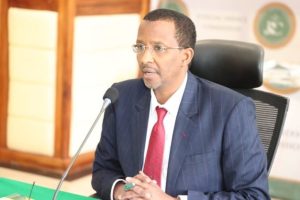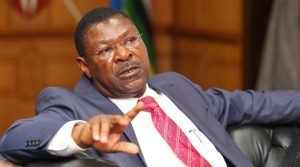
Peter Ndegwa of Safaricom is open to partnering with Starlink.
Elon Musk’s Starlink, a tech giant that has upended the internet market with its aggressive packages and faster internet speeds, plans to collaborate with Safaricom, the biggest telecom network provider in Kenya.
According to Peter Ndegwa, CEO of Safaricom, in an interview with Bloomberg, the possible collaboration will guarantee that Musk’s Starlink enhances the indigenous technology.
He went on to say that satellite technology works well for getting internet access to places that fiber-based technology—which is what Safaricom and other local providers use—cannot, such as rural areas.
Ndegwa also praised Safaricom’s influence, pointing out that fiber optic cable is increasingly popular for homes and international corporations and that 4G technology has a 95% nationwide reach.
In response to worries that Starlink’s wave would be halted, the CEO wrote the Communications Authority of Kenya (CA) pleading with them to reevaluate their decision to license satellite internet providers.
From a satellite standpoint, we will need to collaborate in the future with Starlink or other satellite service providers to ensure that that technology works as intended. We will keep having talks as long as they enhance what we are providing, as we have already had some,” he told an American news organization.
“In the area, fiber is among the best. The satellite enhances or adds to the existing technology. We’re informing the regulator that, rather than competing in urban areas, satellite is used in areas that aren’t currently covered because it will benefit the nation. We will handle the competition, so we’re not concerned about it.”
That is the key point, as we are powerless to stop anyone from conducting business in Kenya. That is a choice made by regulators.” A number of governments worldwide, including those in Taiwan and India, have expressed concerns regarding the compliance of satellite internet services with local laws.
Locally, detractors claim that Starlink lured customers in with better deals and swept the market, which was previously primarily controlled by Safaricom. It’s not what I would call dominance. Because we have made long-term investments in Kenya, we have been successful.
Many people are unaware that we obtained licenses concurrently with the industry as a whole, according to Ndegwa. “Every year, we invest between $300 million and $350 million to build out our infrastructure and keep granting access.
“Every year, we pay one billion US dollars in taxes. Our company is the biggest one that is listed on the stock exchange. It’s obvious that we have a voice, and we must ensure that it is heard, but we don’t want to restrict customer options.
” During a roundtable discussion in New York, President Ruto recently offered his thoughts on the subject, saying that Starlink’s presence has encouraged healthy competition in the market, pushing Safaricom to offer better services.
“My CEO at Safaricom gets upset with me occasionally for introducing figures like Elon Musk and others into the field. Peter has been doing pretty well, I must say; he’s really stepped up his game. I keep telling him that competition keeps you ahead of the game.”
Pepe TV is a vibrant broadcasting network dedicated to bringing you the best in global entertainment, news, and culture. We strive to deliver diverse content that keeps you informed, entertained, and connected to the world around you.
Copyright © 2024 All Rights Reserved






